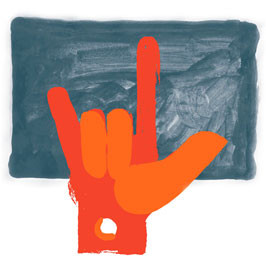Breaking the Silence

How do you speak the gospel into silence? How do you share Christ with those who cannot hear your voice? In the United States alone, as many as 2 million deaf individuals are currently unable to listen to your sermons or to communicate freely with your church members.1
“About 20 percent of Americans have some level of hearing loss,” says Dr. Marguerite Dartt, an Arizona-based audiologist who is also fluent in American Sign Language. “Deaf individuals have such severe hearing loss that they cannot be helped with hearing aids or cochlear implants, and they communicate through ASL. It is actually the fifth-largest minority language in the United States.”
Major and unreached
This language barrier has left an astonishing majority of America’s deaf outside the church. Two reasons are often given for this surprising statistic: First, the deaf cannot assimilate by learning English, as can native speakers of other languages; and second, failed ministries to the deaf have left parts of the ASL culture with a view of the church as both unreliable and less than loving.
Three levels of ministry to the deaf are practiced daily in EFCA churches across the United States. Each represents an increased level of commitment and cost, and each offers concomitant benefits for those who are deaf.
- The first approach—requiring only minimal funding—implements specialized technology so that the deaf and hard of hearing feel more connected to your church (see “Technology Choices” below).
- The second level involves training (or hiring) hearing signers who can interpret your church’s public events (sermons, songs, classes) as well as provide a translation bridge between hearing and nonhearing attendees.
- The third level recognizes that the deaf have their own culture. Consequently, language translation alone is not fully adequate to carry out a comprehensive ministry. This level uses both hearing signers and deaf leaders to provide a church within a church.
Learning the language
Ray and Jan Hollis of the Gathering (EFCA) in Oklahoma City had no family history of deafness, but when two of their three children were born profoundly deaf, they began to minister in these new ways.
“The fields are white and ready for harvest, but to reach the deaf, we must learn their language,” Pastor Ray Hollis says.
Training church members to become fluent ASL interpreters requires a multi-year commitment, which doesn’t end when the classes are completed. Paid professional services might be available in your area, but Ray warns: “We can’t assume that any certified professional interpreter can communicate God’s Word effectively.”
Leon Devriendt, like the Hollises, is a strong advocate of the third-level approach, which goes beyond interpreting to empowering the deaf as both teachers and leaders. Leon is a lay leader at Hope Church (EFCA) in Springfield, Ill.
“I teach a Bible study every week in ASL,” he signs through an interpreter. “We started a ministry with two deaf almost a year ago, and we have 10-15 now. I want more deaf people to know Him, so we have formed a deaf ministry team.”
Leon’s team comprises both hearing and deaf members drawn from the staff and congregation.
Where to start
Hope Church and The Gathering represent only two of a growing number of EFCA congregations that are recognizing the open door for ministry to this long-overlooked group.
The consensus of both hearing and deaf ministers is that deaf ministry is rewarding, but that counting the cost is key. It takes a long-term, loving and compassionate commitment.
“They are not a project,” Ray agrees. “They are people. It is important that whoever begins a deaf ministry plans to continue and make it quality. Get involved for the long haul.”
Those who choose to communicate Christ’s love in this way can look forward to watching the gospel break all kinds of silence.
According to Dr. Marguerite Dartt, an Arizona-based audiologist.
Send a Response
Share your thoughts with the author.